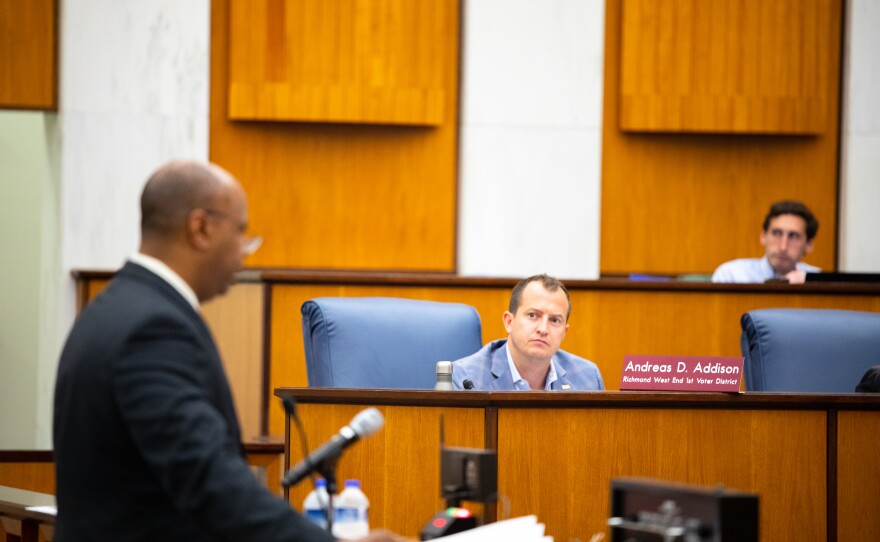Richmond City Council approved the creation of a Public Utilities and Services Commission at its Monday meeting amid calls for better oversight of the city Department of Public Utilities.
The commission, once organized, will advise City Council and the mayor on “matters involving the operation, maintenance, and expansion of the City’s public utilities, including natural gas, clean drinking water, wastewater, solid waste, and stormwater.”
“We are looking for transparency, accountability, understanding of exactly what is going on with our utilities,” said Andreas Addison, 1st District councilor and patron of the PUC ordinance.
The PUC’s responsibilities will include:
- reviewing reports and information on the operations or policy/service changes of Richmond DPU and DPW
- making recommendations to council and the mayor relating to DPU operations
- assisting the mayor, council and city employees with the review of any issues requiring study to enhance performance without impacting regulatory compliance
- creating subcommittees, including: Water, Stormwater, Wastewater, Solid Waste, Natural Gas utility operations
- increasing public engagement to create transparency/inform the public of future city planning related to stormwater, energy conservation, clean drinking water, wastewater utilities
- conducting research and requesting access to interview city administrators, residents, subject matter experts, municipal leadership and other stakeholders to discern issues related to service delivery
- providing advice on how the city can transition away from the use of its gas utility in accordance with Richmond’s climate and ecological emergency declaration, as detailed in Resolution No. 2021-R049 and the city’s master plan
- making recommendations on fiscal integrity and viability of city utilities
- submitting an annual report on Oct. 31 of each year, as well as other reports in response to requests from council or the mayor
The commission’s first report is due Oct. 31, 2024. It’s required to meet quarterly, but may meet as much as deemed necessary.
According to the ordinance, the PUC will include 21 members. Thirteen will have the ability to vote on matters before the commission. Voting members of the commission will include commercial and residential ratepayers appointed by council and the mayor. More than half must be residential customers.
The mayor will also appoint four nonvoting members to represent the departments of Public Utilities, Public Works and Sustainability, and Richmond and Henrico Health Districts. Four other nonvoting positions will be reserved for representatives of public utilities departments in Chesterfield, Hanover, Henrico and Goochland counties (at least some residents of these counties are served by Richmond DPU).
A commission chairperson and vice chairperson will be selected by members of the panel. No member will receive a salary.
The expected annual cost of the commission will be $5,000 to cover staff costs.
Much of the push for the commission has come from environmentalists in Richmond, who are pressuring the city to craft a plan to retire its natural gas distribution system — a goal outlined by council in its 2021 climate emergency declaration.
Kevin Cianfarini is a volunteer with ElectrifyRVA, a local coalition that advocates for the implementation of policy goals listed in the emergency declaration. Cianfarini noted the scale of Richmond Gas Works — which serves about 118,000 connections, making it the eighth-largest municipal gas utility in the country.
“We are the only one without some form of specialized oversight,” Cianfarini said.
Cianfarini said data analysis and on-the-ground monitoring has shown the city has over 900 active leaks in its gas system. They can be dangerous, are always wasteful — and natural gas is mostly made up of methane, a potent greenhouse gas.
According to Billy Vaughan, DPU finance director, it will cost the city about $760 million to complete a systemwide rehabilitation effort, which has been ongoing since 1992.
Cianfarini argued that spending that money won’t eliminate leaks.
“This is not the fault of the workers within the gas system. This is just a matter of fact, that gas leaks,” Cianfarini said.
During a March 2023 council meeting, 2nd District councilor Katherine Jordan said the city should reconsider any further expansion of its gas system.
“What's the next 20 years for a city that has decided it's going to be an energy provider for its residents, for its businesses?” Jordan said. “Is natural gas the energy source we want to be relying on? Personally, you know, to me, no — I think we need to be transitioning towards renewable energies.”
Richmond utility bills are going up across the board. The city has estimated that a standard city utility customer pays $8.86 more per month now than at the start of this year due to infrastructure maintenance, regulatory compliance costs and material costs.



